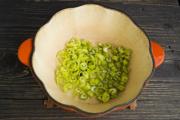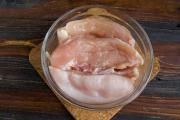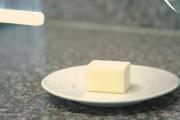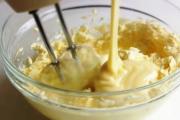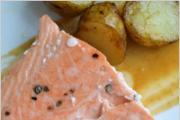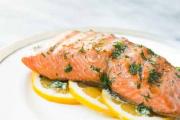Calorie content of mayonnaise, useful and harmful properties. Mayonnaise - calorie content and BJU, harm and health benefits of the product Calories in 100 g of mayonnaise
Mayonnaise is a product that, according to the site fotodiet.ru, is unreasonably widely used in our kitchen. It allows you to hide the flaws of the hostess, but at the same time, it also hides the true taste of the food. In addition, it is unhealthy. This is especially true for grocery stores. The vast majority of mayonnaise on our shelves does not consist of natural products. Vegetable oil is replaced with synthetic trans fats, an emulsifier, flavor enhancers, preservatives are added, and a completely chemical product is obtained, from which there is only one harm.
Moreover, the calorie content of such a product is close to the calorie content of fats and vegetable oils. So a regular Provencal mayonnaise in 100 grams contains 500 calories, and homemade mayonnaise contains more than 600 calories.
Therefore, if your health is dear to you, mayonnaise has no place on your table. Well, for the holiday, make your own mayonnaise using an old homemade recipe.
Homemade mayonnaise recipe:
You'll need:
Chicken egg - 4 pcs.
Olive oil - ½ liter.
Sugar - 1 tsp.
Salt - 2 tsp.
Mustard - 2 tsp.
Wine vinegar 3% - 2 tbsp spoons.
Ground black pepper.
For cooking, carefully separate the egg yolks and beat thoroughly with mustard, salt and pepper. Beat by hand, rotating the whisk in the same direction, adding a drop of vegetable oil.
After about 1/3 of the oil has got into the sauce, it can already be poured in a thin stream.
After adding all the oil, the mass becomes homogeneous, thickens and begins to lag behind the walls of the bowl.
To give the sauce the necessary pungency, 3% wine vinegar is added, and after that the mass turns white and the mayonnaise is ready. The shelf life of such a product is only 72 hours.
Calorie table for mayonnaise, sauces, ketchup, mustard per 100 grams
|
Product |
Protein |
Fats |
Carbohydrates |
Kcal |
|
Mustard |
162 |
|||
|
Sen Soi dressing for funchose in Korean |
10.1 |
541 |
||
|
Ketchup |
22.2 |
93 |
||
|
Diet mayonnaise |
204 |
|||
|
Homemade mayonnaise |
58.7 |
568 |
||
|
Mayonnaise European |
665 |
|||
|
Light mayonnaise |
299 |
|||
|
Mayonnaise Amateur |
449 |
|||
|
Provencal mayonnaise |
624 |
|||
|
Milk table mayonnaise |
627 |
|||
|
Extra light mayonnaise |
110 |
|||
|
Orange sauce |
55 |
|||
|
Barbecue sauce |
39.4 |
166 |
||
|
White sauce |
56 |
|||
|
Worcestershire sauce |
19.5 |
78 |
||
|
Mushroom sauce |
82 |
|||
|
Curry sauce |
23.1 |
14.9 |
267 |
|
|
Sweet and sour sauce |
39.7 |
167 |
||
|
Sweet and sour sauce with pineapple |
21.2 |
89 |
||
|
Cranberry sauce |
42.2 |
180 |
||
|
Sauce cocktail |
11.6 |
329 |
||
|
Red main sauce |
48 |
|||
|
Onion sauce |
75 |
|||
|
Mayonnaise sauce with sour cream |
31.9 |
312 |
||
|
Milk sauce |
84 |
|||
|
Rice sauce Mirin |
52.2 |
258 |
||
|
Sour cream sauce |
78 |
|||
|
Sour cream sauce with mushrooms |
14.5 |
169 |
||
|
Classic soy sauce |
58 |
|||
|
Cheese sauce |
356 |
|||
|
Horseradish sauce |
27 |
|||
|
Tkemali sauce |
418 |
|||
|
Tomato sauce |
80 |
|||
|
Spicy tomato sauce |
21.8 |
98 |
||
|
Dill sauce |
309 |
|||
|
Blackcurrant sauce |
19.4 |
77 |
||
|
Apple sauce |
77 |
|||
|
Tomato paste |
16.7 |
92 |
Nika Sestrinskaya -specially for the site site
Mayonnaise increases a person's appetite and improves taste qualities dishes. But doctors recommend cutting back on industrial sauce, as it contains harmful chemical additives. 100 grams of classic mayonnaise contains about 600 calories, so it should not be eaten by people prone to weight gain. Its regular use provokes diseases of the stomach and liver, worsens the condition of the human skin and leads to obesity. As an alternative to the harmful sauce, you can make your own mayonnaise from natural ingredients.
Weight Loss Stories STARS!
Irina Pegova shocked everyone with a weight loss recipe:"I threw off 27 kg and continue to lose weight, I just brew it for the night ..." Read more >>
Calorie content and BZHU
The mayonnaise, which is sold on store shelves, is high in fat. Therefore, doctors recommend strictly limiting its use.
1 tablespoon of top mayonnaise - 40 grams of product, 1 teaspoon - 12 grams.
The calorie content of mayonnaise and the content of proteins, fats and carbohydrates (BZHU) in its composition depend on the brand of the manufacturer. Therefore, in order to calculate the energy and nutritional value of a tablespoon and a teaspoon of sauce, you need to refer to the table below.
The table shows KBZhU per 100 grams of mayonnaise.
Industrial product harm
The harmfulness of mayonnaise for the human body is due to the ingredients that make up it:
- For the production of the sauce, refined vegetable oil is used, as a result of processing of which harmful trans fats are formed. Pregnant women should not eat such foods, because they provoke fetal pathologies. Scientists have proven that men who regularly eat processed foods and fast food with a lot of mayonnaise decrease testosterone levels and deteriorate sperm quality.
- Flavors and flavor enhancers are addictive and increase a person's appetite. Accumulating in the body, they lead to gastrointestinal upset. The disease is characterized by pain in the stomach, nausea, vomiting and flatulence. In children, flavors can cause symptoms of an allergic reaction.
- Preservatives prolong the shelf life of the mayonnaise and prevent the appearance of dangerous microorganisms in the sauce. They provoke intestinal upset, negatively affect the state of the nervous system and lead to the formation of kidney stones.
- Synthetic emulsifiers are used in the preparation of mayonnaise to give it a smooth consistency. They provoke inflammatory processes in the kidneys, increase blood cholesterol levels and disrupt the work of the cardiovascular system.
It should be noted that more and more manufacturers do not add artificial colors, preservatives and flavorings to mayonnaise. Before buying, you should familiarize yourself with the composition of the product and the expiration date (the shorter the better).

The benefits of homemade sauce
Homemade mayonnaise contains natural ingredients that, if consumed in moderation, do not harm human health. It can be eaten by both adults and children.
Components homemade sauce and their beneficial properties:
- Chicken eggs are easily absorbed by the body, so their use does not lead to a set of extra pounds. The chemical composition of the product includes vitamins A, B1, PP, K, as well as minerals: calcium, potassium and iron. Eggs help accelerate metabolism, cleanse blood vessels and develop mental abilities.
- Lemon juice is a valuable source of vitamins necessary for the normal functioning of the body. Vitamin C in its composition strengthens the walls of blood vessels and improves immunity.
- Vegetable oil contains fatty acids that maintain vascular strength and prevent the accumulation of fat in the liver tissue. It also protects the stomach lining.
- Mustard improves the taste of homemade mayonnaise and makes protein foods easier to digest. The seasoning can be eaten by people who are on a strict diet or follow the principles of good nutrition (PP), as it activates the metabolism and promotes the breakdown of fats.

Recipes
Homemade mayonnaise is a healthy and tasty alternative to industrial sauce. They can be used to dress Olivier salad, herring under a fur coat, vegetable salad or use it alone as a sauce for main dishes. Below are two popular recipes that take less than five minutes to cook.
Provencal
For cooking classic sauce you will need the following ingredients:
- chicken egg - 1 pc. ;
- lemon - 1/2 pc.;
- refined vegetable oil - 300 ml;
- salt - 1/2 tsp;
- granulated sugar - 1 tsp;
- mustard - 1/2 tsp;
- ground black pepper - 1/4 tsp.
Preparation:
- 1. Break into the bowl egg... Add spices and vegetable oil to it.
- 2. Squeeze juice from half a lemon and add it to the rest of the ingredients.
- 3. Using a hand blender, beat the mixture until smooth and fluffy. Whisking will take 40-60 seconds. Transfer the finished mayonnaise to a convenient container and store it in the refrigerator.
Spanish garlic mayonnaise
The peoples of the Mediterranean use Alioli sauce as a dressing for fish dishes and salads. To prepare it you will need:
- garlic - 2 cloves;
- chicken egg - 1 pc.;
- refined olive oil - 200 ml;
- salt to taste.
Being a frequent guest on the table, mayonnaise sauce requires special attention in the study of its beneficial and harmful properties. Indeed, most often, mayonnaise, which is used in home cooking, is an industrial product. And not every consumer knows about its composition.
Benefit

If you choose mayonnaise based on its benefits for the body, then the answer is unequivocal: only homemade mayonnaise is good for health. It contains a protein useful for the human body (the amino acid albumin). The yolk found in homemade mayonnaise is rich in choline. And vegetable oil contains healthy cholesterol and unsaturated fats, which are sources of easily digestible energy. Mayonnaise is not a dietary product. The oil reduces the risk of cardiovascular diseases and vascular blockages. Vitamin E protects the body from a harmful and aggressive environment, and vitamin F normalizes metabolism. Also, the oil helps to absorb vitamin A, which slows down the aging of the body. Vinegar kills harmful bacteria by acting as a preservative. Only homemade mayonnaise will benefit. But in the case of improper preparation (or long-term storage without preservatives), you can get food poisoning. Depending on the fat content, this product is divided into three groups:
- high in calories (from 55% fat);
- medium-calorie (40-55% fat);
- low-calorie (up to 40% fat).
The benefits of store-bought mayonnaise are highly questionable. The only and main thing is useful property consists in the prevention of thinness and dystrophy, which is important for people who seek to gain weight.
Harm

If homemade mayonnaise consists of natural products, then store (industrial) includes artificial additives, dyes and emulsifiers. When it is used, there is a high probability of upsetting the digestive system, increasing hair fragility, and the skin suffering from acne and acne.
As a high-calorie food, mayonnaise is the reason for the extra pounds. Homemade mayonnaise contains a moderate dose of carbohydrates, a small amount of saturated fatty acids, and is free from carcinogens. Store-bought mayonnaise is low in carbohydrates, high in saturated fat, many harmful ingredients, and even carcinogens:
- thickeners, stabilizers: pectins (E-440), sodium alginate (E-401), microscopic cellulose (E-460), sodium carboxymethyl cellulose (E-466), carrageenan (E-407), locust bean gum (E-410) ), agar (E-406), propylene glycol alginate (E-405), guar gum (E-412), xanthan (E-415);
- emulsifiers: E-472, E-322, mono- and diglycerides of fatty acids (E-471);
- maltodextrin, modified starches (E-1400, E-1442).
Calorie content
Table dairy mayonnaise contains 627 kcal (31.35% of the daily value of 2000 kcal). And 100 grams of light store mayonnaise accounts for 204 kcal (10.2% of the daily value).
The nutritional value
| Item name | Quantity (per 100 grams) | % daily value | ||
| Dairy table | Light | Dairy table | Light | |
| Protein | 2,4 | 0,3 | 5,2 | 0,42 |
| Fats | 67 | 30 | 120 | 50 |
| Carbohydrates | 3,9 | 5,2 | 1,6 | 2,06 |
| Saturated fatty acids | 9,1 | 20 | 50,56 | 111 |
| Polyunsaturated fatty acids | 30 | 3,2 | 500 | 8,89 |
| Monounsaturated fatty acids | 12,5 | 2,1 | 34,72 | 5,83 |
Contraindications
Industrial mayonnaise is contraindicated even for a completely healthy person. Artificial additives contain harmful and unusable ingredients. Of the most dangerous are trans fats, which are not broken down and accumulate in the body.
Their excess leads to atherosclerosis, obesity and metabolic disorders. At the same time, most of all harmful substances are found in low-calorie mayonnaise. Many consumers who are afraid of being overweight or high cholesterol choose diet mayonnaise. But often the fats in it are replaced with starch, water and various emulsifiers. It is strictly forbidden to use industrial mayonnaise during pregnancy, nursing mothers and infants. Also, the product is contraindicated for people suffering from gastrointestinal diseases and increased gastric acidity.
Vitamins and minerals
| Vitamin name | Quantity (in 100 g.) | % of the norm per day | ||
| Dairy table | Light | Dairy table | Light | |
| Vitamin A (Retinol Equivalent) | 0.01 mg | 0 | 1,1 | 0 |
| Vitamin E (Tocopherol) | 30 mg | 0 | 200 | 0 |
| Vitamin B1 (Thiamin) | 0.01 mg | 0 | 0,7 | 0 |
| Vitamin B2 (Riboflavin) | 0.08 mg | 0 | 4,4 | 0 |
| Vitamin PP (Niacin Equivalent) | 0.5 mg | 0 | 2,5 | 0 |
Also, mayonnaise may contain some minerals.
| Mineral name | Quantity (per 100 g) | % daily value | ||
| Dairy table | Light | Dairy table | Light | |
| Calcium | 57 mg | 0 | 5,7 | 0 |
| Magnesium | 11 mg | 0 | 2,8 | 0 |
| Sodium | 513 mg | 0 | 39,5 | 0 |
| Potassium | 63 mg | 0 | 2,5 | 0 |
| Phosphorus | 56 mg | 0 | 7 | 0 |
| Iron | 0,4 mg | 0 | 2,2 | 0 |
If you want to get the most out of your food intake, you should only include homemade mayonnaise in your diet. Considering that it is easy to cook it at home, it is worth learning the simple subtleties of making mayonnaise, delighting yourself and loved ones with healthy food.
Sour cream is a fermented milk product obtained by condensing milk and fermenting it. It has long been prepared in Russia in almost every home. A special sourdough was dipped into a jug of milk and after a while the resulting white thick mass was “swept away” on its surface, for which it got its name. It is also hard to imagine modern kitchen without this product.
Salads are seasoned with sour cream, eaten with dumplings and dumplings, various sauces and pastries are prepared on its basis. It is rather difficult to buy such a product abroad, because there it is called “Russian cream” and is not produced on its own. However, these two products are not at all the same, unlike cream, sour cream is less high in calories and is easier for the human body to absorb.

Composition
The lactic acid bacteria found in sour cream allow a person to easily get all the beneficial substances from it.
And sour cream contains a huge amount of useful substances: these are vitamins of various groups, and a rich mineral composition:
- retinol (vitamin A) - good for vision;
- tocopherol (vitamin E) - promotes the absorption of retinol, and also thins the blood, removing the risk of blood clots;
- ascorbic acid (vitamin C) - has a tonic effect;
- calciferol (vitamin D) - helps with rickets and lack of calcium in the body;
- choline, riboflavin, biotin and other B vitamins also have many positive effects on the human body;
- iron and magnesium - indicated for use by women during the period of gestation and childbirth;
- potassium and calcium - will help build a healthy skeleton during the growing up of a child;
- Copper is beneficial for proper estrogen production.
In addition, sour cream contains zinc, chlorine, phosphorus, iodine, magnesium and other useful minerals.


Thanks to such a rich composition, sour cream has many useful properties.
- With its help, you can restore strength after a serious illness or exhaustion of the body.
- It has a positive effect on the nervous system due to the high content of vitamin B.
- Sour cream should be used for diseases of the intestines and stomach, constipation and ulcers. It normalizes the digestive system and relieves pain.
- It is useful for men to use this product for diseases of the urinary tract and to improve the quality of sperm.
- Sour cream is smeared on the burned areas of the skin with sunburn and is used as a cosmetic. Masks made from it moisturize and nourish the skin of the face and body.
- Fermented milk sour cream can be consumed by those people who poorly digest ordinary milk.


Sour cream is loved by both adults and children because of its delicate milky taste with a slight sourness.
There are certain restrictions on its use.
- Fatty sour cream is not recommended for obese and overweight people.
- You should not eat it for those people who are allergic to fermented milk products or lactose intolerance.
- Of course, the cholesterol content in fermented milk products is much lower than in vegetable oils, for example, sunflower or olive. However, their use is still not recommended for people with high blood cholesterol.
- You should not purchase products with high fat content for those who have liver or gallbladder problems.
The nutritional value
The fat content of sour cream directly affects its calorie content. Therefore, its nutritional value per 100 grams of product depends on the percentage indicated on the package.
The lightest fat-free product has a label that indicates 10%, and per 100 g contains:
- 115 kilocalories;
- 3 g protein;
- 10 g fat;
- 2.92 g of carbohydrates.

15% sour cream is more nutritious and contains:
- 160 kcal;
- 2.6 g protein;
- 15 g fat;
- 3 g of carbohydrates.

One of the most popular products for many years has been a product with 20% fat content, the composition of which is as follows:
- 207 kcal;
- 2.9 g protein;
- 20 g fat;
- 3.2 g of carbohydrates.

Rarely enough, you can see sour cream with 25 or 30% fat on the shelves. The first consists of 2.6 g of protein, 25 g of fat and 2.4 g of carbohydrates per 100 g, and has a caloric value of about 250 kcal. The second contains very little protein (2.3 g), but a lot of fats and carbohydrates (30 g and 3.3 g). In addition, such a fatty product has a lot of calories per 100 g (about 300 kcal). In terms of its calorie content, it is only slightly inferior to mayonnaise, but it is still much more useful in its composition.
Diet people tirelessly monitor the calorie content of each meal they eat. Nevertheless, it is quite difficult to calculate the calorie content of a salad or dough with sour cream if you know its nutritional value only per 100 g. It is most convenient to calculate the calorie content of a product in 1 teaspoon or 1 tablespoon.

Glycemic index
The rate of increase in blood glucose obtained from digested food can be plotted as a scale. This scale contains 100 divisions, where 100 is the rate when pure glucose is consumed. A certain food has its own speed on this scale, and this figure is called the glycemic index (GI) of the food. The healthiest foods have the lowest GI values, and they contain slow carbohydrates, which are converted into energy by the body. Food with fast carbohydrates does not provide energy to the human body, but only increases blood sugar and is quickly deposited under the skin in the form of a fat layer.
The glycemic index of sour cream, like its calorie content, depends on the percentage of fat content. In addition, for products of the same fat content, but from different manufacturers, the GI index can differ significantly.
It depends on many factors:
- the quality of the original raw materials and additives;
- the expiration date of the goods;
- storage conditions;
- recipes.

It is impossible to determine the glycemic index of sour cream on your own; this will require a whole laboratory with sophisticated equipment. It is enough to roughly represent the average indicators in order to make a decision on the correctness of the use of this or that type of sour cream in food.
Particular attention to the glycemic index of food should be given to those people who have diabetes. For example, the most popular sour cream with 20% fat content is not recommended for diabetics. However, it is not necessary to completely abandon tasty sour cream, the main thing is to consume it no more than a couple of teaspoons a day.

Sour cream of any fat content can be found in almost any grocery store or hypermarket. However, if there is an opportunity to make it yourself from natural products, this should not be neglected.
For the most simple recipe thick homemade sour cream will need:
- 1 liter of milk (unpasteurized);
- 4 tablespoons of kefir.

The milk is brought to a boil and cooled to a temperature of 40 degrees. Warm liquid pours into glass jar and kefir is added to it. Everything is shaken well and removed to a warm place for 7-8 hours. You can wrap the jar with a warm blanket or blanket to cool the contents more slowly.
After the specified time has elapsed, the contents of the jar are thrown back onto cheesecloth laid in a colander and drained in a cool place for another 7-8 hours. To make the sour cream thicker, you need to stir the mass periodically - this way the whey separates faster. The finished sour cream can be whipped with a blender to make it more uniform and smooth. The finished product is stored in a refrigerator in a glass container.

Sour cream is a versatile product. It is used in cosmetology, folk medicine and, of course, in cooking. It is added to the first courses, for example, to borscht or hodgepodge. On the basis of the product, dough is prepared for various baked goods. It is used as an ingredient in dishes such as goulash or julienne. Sour cream sauce with chopped herbs is perfect for many second courses: various cereals, dumplings and cutlets, potatoes and cheese cakes.
Sour cream is used in any salads and is used in desserts. If you mix sour cream with sugar and season fresh strawberries with this sauce, you get an excellent fruit salad, not only tasty, but also healthy. Many lovers of a fermented milk product make various drinks based on it. A mixture with tomato or carrot juice is especially good.
Sour cream is great for creating proven favorites as well as a variety of recipes.


For information on which sour cream to choose in the store, see the next video.

